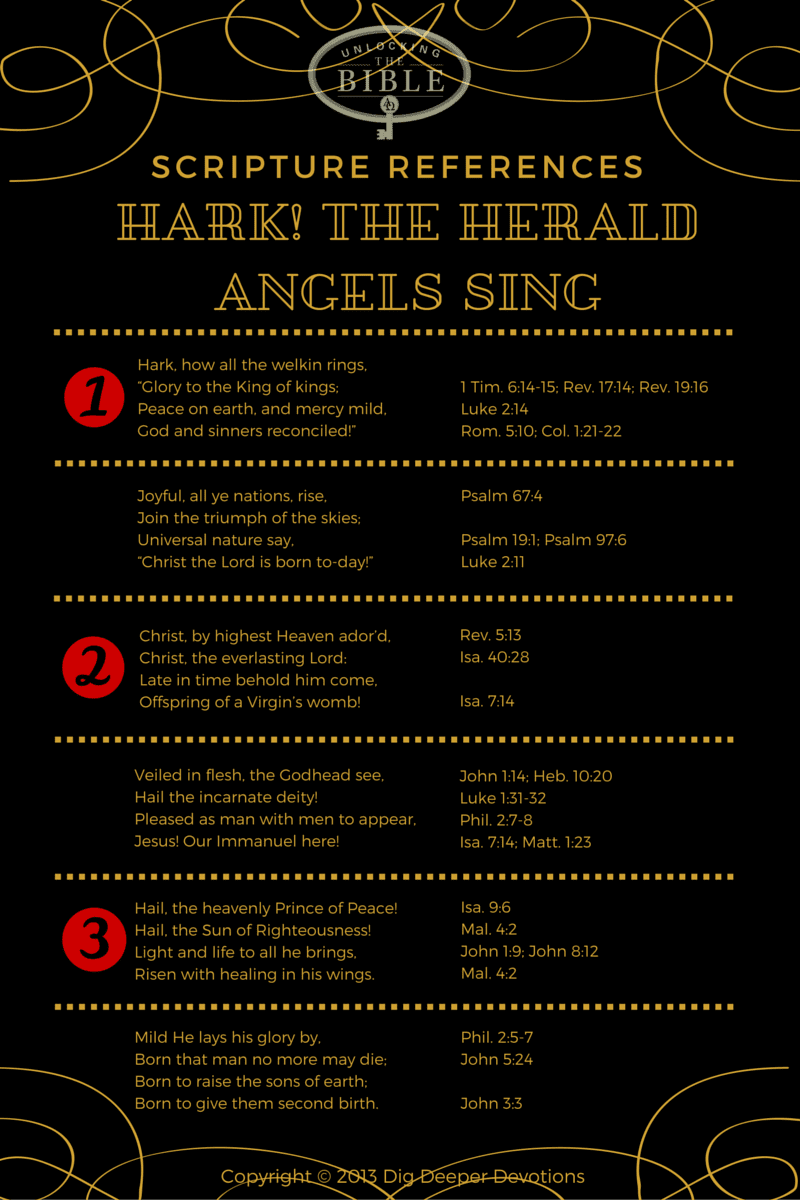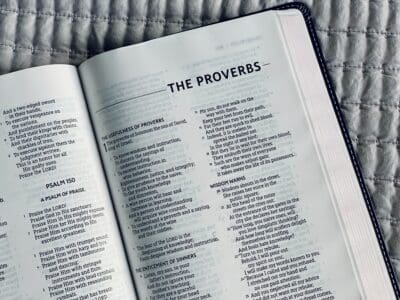On December 18, Charles Wesley celebrates his 308th birthday — in heaven, of course. I wonder if the heavenly choirs will celebrate by singing “Hark! the Herald Angels Sing.” If they do, I’m confident the three persons of the Godhead will be delighted. After all, Wesley’s beloved Christmas carol refers to many prophecies that foretold not only the birth of our Savior but also his return.
Wesley knew how to pack a hymn with theology. As a preacher, he wanted his listeners to hear the truth of God’s Word; as a hymn writer, he endeavored to present those truths in a memorable format.
Doctrine in Song
 In the original version of “Hark! the Herald Angels Sing,” Wesley referred to at least forty Scripture passages. In doing so, he alluded to many doctrinal truths about the person and work of Jesus Christ — emphasizing his deity, his redemptive work, and his Second Coming. For example, the original first stanza covers all three of those doctrines:
In the original version of “Hark! the Herald Angels Sing,” Wesley referred to at least forty Scripture passages. In doing so, he alluded to many doctrinal truths about the person and work of Jesus Christ — emphasizing his deity, his redemptive work, and his Second Coming. For example, the original first stanza covers all three of those doctrines:
Hark, how all the welkin [sky] rings,
“Glory to the King of kings;
Peace on earth, and mercy mild,
God and sinners reconciled!
As Paul wrote in Colossians 1:22, God “reconciled you by Christ’s physical body through death to present you holy in his sight, without blemish and free from accusation.”[1] In other words, Jesus’ death as the sinless Son of God brought about peace between God and us. Peace on earth, however, will not be realized until “the appearing of our Lord Jesus Christ, which God will bring about in his own time” (1 Timothy 6:14-15). Jesus will then be recognized on earth as the King of kings.
Another clear reference to Jesus’ dual role as Savior and sovereign is contained in this stanza:
Hail, the heavenly Prince of Peace!
Hail, the Sun of Righteousness!
Light and life to all he brings,
Risen with healing in his wings.
Prophecy in Song
Wesley combined two prophecies about the millennial reign of Jesus Christ here — familiar words from Isaiah 9:6 and less familiar words from Malachi 4:2. Isaiah’s prophecy begins with phrases we associate with the First Coming: “unto us a child is born, unto us a son is given” (KJV). But the words that follow refer to the Second Coming: “and the government will be upon his shoulders” (KJV).
Malachi’s prophecy doesn’t refer to the First Coming at all. Chapter 4 begins with “the day is coming; it will burn like a furnace” (v. 1). The illuminating, purifying rays of the Light of the world will set “the arrogant and every evildoer” on fire (v. 1). The phrase “Sun of Righteousness” actually refers to sunlight, not the sun itself (v. 2). Malachi’s point is that during Jesus Christ’s reign on earth, the purity of his righteous rule will destroy evil just as the rays of the sun dispel darkness (vv 1-2). But, Malachi adds, the rays of the sun also bring life and healing to “you who revere [God’s] name” (v. 2).
Isaiah and Malachi, and the other Old Testament prophets, always balanced a message of coming judgment with the comfort of future restoration. And they always encouraged God’s people to prepare themselves for both events by repenting of their sins and obeying God’s commandments. Wesley, both preacher and poet, did the same thing in his hymns.
Application in Song
In two stanzas of “Hark! the Herald Angels Sing” that aren’t normally included in American hymnals, Wesley wrote these words:
Adam’s likeness, Lord, efface;
Stamp Thy image in its place.
Second Adam from above,
Reinstate us in thy love.
Let us Thee, though lost, regain,
Thee, the life, the inner Man:
O! to all thyself impart,
Form’d in each believing heart.
Wesley understood that the proper response to the birth of Jesus Christ was a personal response: “each believing heart” should ask the “Second Adam” to “stamp [his] image” on his or her “inner Man.”
Wesley’s reference to the “Second Adam” may come from Romans 5:17-20. There, Paul says,
For if, by the trespass of the one man [Adam], death reigned through that one man, how much more will those who receive God’s provision of grace and of the gift of righteousness reign in life through the one man, Jesus Christ…For just as through the disobedience of the one man [the first Adam] the many were made sinners, so also through the obedience of the one man [Jesus Christ, the second Adam] the many will be made righteous.
When Wesley used “inner man,” he could have been referring to Paul’s prayer in Ephesians 3. The apostle asked God to “grant [the Ephesians], according to the riches of his glory, to be strengthened with might through his Spirit in the inner man” (v. 16 NKJV).
By using these Scriptures, Wesley is also circling back to his original point in stanza one of the hymn — the reason the angels rejoiced when Christ was born was that the reconciliation God had promised Adam and Eve in Eden would soon be accomplished (Genesis 3:15).
Singing with the Angels
Are we evidence of that reconciliation? Has Jesus stamped his image on us so clearly that other people see him in us? Our lives should reflect the joyous truth of “God and sinners reconciled.” But are we so busy decorating, shopping, and partying that the joy of that Christmas message has been shoved into the corner of a Sunday morning worship service or a Christmas carol sing-along?
This Christmas, let’s commit ourselves to being a clear reflection of Jesus Christ, the Second Adam. May fellow shoppers and every salesclerk see him in our kind words and courteous actions. May family members recognize his love in our patience. May we demonstrate his generosity in our service to the less fortunate. We may spark a spiritual flame in someone’s hardened soul by saying “Merry Christmas” instead of “Happy Holidays.” May we joyfully share the good news of Jesus Christ with someone who needs to hear it.
My Christmas prayer is this: Lord, may I look less like the First Adam and more like the Second Adam with each passing day. And may my life, along with the angels, proclaim these words louder, longer, and brighter than my voice:
“Glory to the King of kings;
Peace on earth, and mercy mild,
God and sinners reconciled!”







